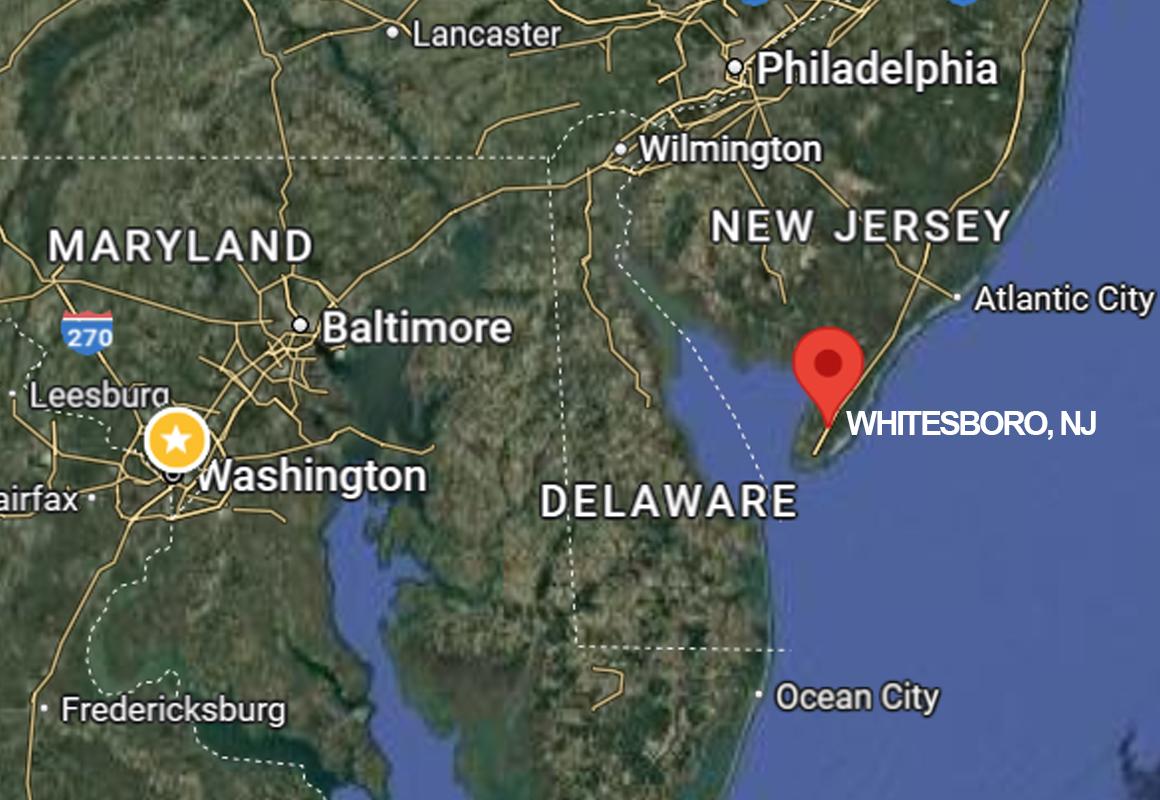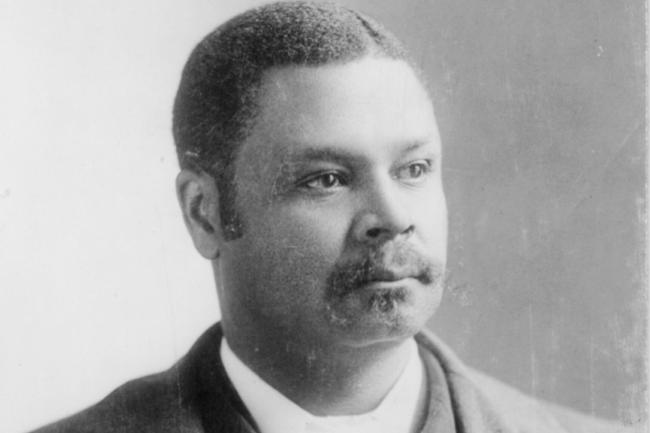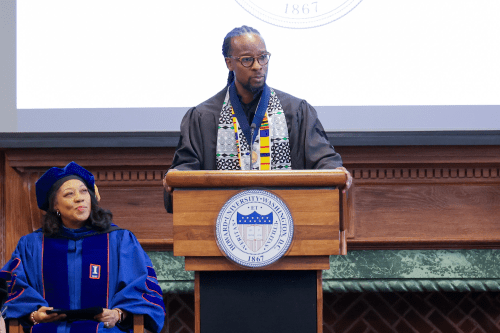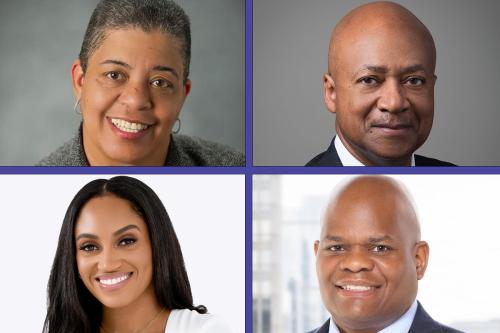“This … is perhaps the negroes' temporary farewell to the American Congress; but let me say, phoenix-like, he will rise up some day and come again. These parting words are in behalf of an outraged, heart-broken, bruised, and bleeding, but God-fearing people, faithful, industrious, loyal people — rising people, full of potential force.”
In the earliest part of the 20th century, Howard alumnus George Henry White, who graduated in 1877 with a degree in teaching, epitomized the concept of self-determination and equitable engagement in American life. As are many Howard alumni, his life and career took many forms — each of which was pivotal to the communities in which he lived. He founded the first Black-owned commercial savings bank in Philadelphia and co-founded the town in New Jersey which bears his name. Born the son of a slave, White nevertheless left an indelible mark on the nation which still reverberates across the centuries.
Maryland Public Television developed the documentary "George H. White, Searching for Freedom," which can be streamed.
During Reconstruction, White fought through a hostile press and threats from the epitome of domestic terror, the Ku Klux Klan, to be elected as a member of the United States Congress in 1896 representing the 2nd Congressional District of North Carolina. As the last Black person to serve in Congress during the Reconstruction era, White was truly “one of one.” He served for two terms as the only Black person in Congress at the time, taking seats on the Agriculture Committee and the committee which oversaw the District of Columbia.
Though the North Carolina native was born to a mixed-race father in 1852 during a period of legal slavery in the South, which would have normally had him classified as a slave, the fact that White’s father was a free man meant that White was also free. Just seven years after Howard was founded, White enrolled. After graduating from Howard, he was an educator in New Bern, North Carolina, and began to study law, eventually earning admission to the North Carolina Bar in 1879. After winning election and reelection as a North Carolina solicitor in 1886 and 1890, respectively, he was the nation’s only elected Black prosecutor.
The Reconstruction period after the Civil War eliminated much of the ability for Southern states to disenfranchise Black voters, and as a result, the majority of voters in the state’s 2nd Congressional District were Black. White defeated the white incumbent in 1896 and was reelected in 1898 as the only Black member of the 55th U.S. Congress.
As the sole Black member of Congress, White became a prominent national voice in the fight against lynching and for equal rights and enfranchisement. He sponsored the first bill to make lynching a federal crime, which would have attached the death penalty to those convicted of the murder. The bill died in committee.
White also boldly advocated for legislation that would have reduced congressional representation from states that insisted on illegally disenfranchising Black citizens. He reasoned that if Blacks were not allowed to vote in the state, then they shouldn’t be included in the number of people each state purported to represent. That metric would reduce the number of members of Congress from those states as dictated by the U.S. Constitution, which apportions congressional seats based on population.
As Reconstruction ended, legislators in North Carolina again found ways to prevent Black citizens from voting, starting with requiring literacy as a requirement of voting. A few short decades after slavery, when teaching a slave to read was illegal, few Black people had any kind of formal education, making most ineligible to vote. White decided to leave Congress in 1901 and practice law in Washington before moving to Philadelphia to open his bank. After White left Congress, no other Black person would serve there for almost 30 years, and no other Black person would be elected from the South for more than 70 years.
White courageously took to the floor of the House of Representatives Jan. 29, 1901, to make now legendary remarks that will forever be in the Congressional Record. He directly confronted the racist members of Congress who were using their position to introduce negative stereotypes and bigoted dispersions about Black people into the national dialogue, which he called, “the persistent efforts of certain gentlemen upon this floor to mold and rivet public sentiment against us as a people and to lose no opportunity to hold up the unfortunate few who commit crimes and depredations and lead lives of infamy and shame, as other races do, as fair specimens of representatives of the entire colored race.” In his speech, he forcefully rejected the arguments used by some of his colleagues to position Blacks as beholden to the altruism of whites at best and the ignorant inflictors of pain upon the white race at worst. He pointed to Black people’s rising literacy rates, property ownership, economic self-sufficiency, and educational attainment.
"You may withhold even the knowledge of how to read God's word and learn the way from earth to glory and then taunt us for our ignorance, but we would remind you that there is plenty of room at the top, and we are climbing."
“We have done it in the face of lynching, burning at the stake, with the humiliation of ‘Jim Crow’ cars, the disfranchisement of our male citizens, slander and degradation of our women, with the factories closed against us, no negro permitted to be conductor on the railway cars, whether run through the streets of our cities or across the prairies of our great country, no negro permitted to run as engineer on a locomotive, most of the mines closed against us,” White said. “Labor unions — carpenters, painters, brick masons, machinists, hackmen, and those supplying nearly every conceivable avocation for livelihood — have banded themselves together to better their condition, but, with few exceptions, the black face has been left out. The negroes are seldom employed in our mercantile stores. At this we do not wonder. Some day we hope to have them employed in our own stores. With all these odds against us, we are forging our way ahead, slowly, perhaps, but surely. You may tie us and then taunt us for a lack of bravery, but one day we will break the bonds. You may use our labor for two and a half centuries and then taunt us for our poverty, but let me remind you we will not always remain poor. You may withhold even the knowledge of how to read God's word and learn the way from earth to glory and then taunt us for our ignorance, but we would remind you that there is plenty of room at the top, and we are climbing. After enforced debauchery, with the many kindred horrors incident to slavery, it comes with ill grace from the perpetrators of these deeds to hold up the shortcomings of some of our race to ridicule and scorn.”
In what was to be his farewell speech as a congressman, White issued a prescient and powerful declaration that while Black legislative participation at the federal level may have been curtailed, it would not be extinguished.
“This … is perhaps the negroes' temporary farewell to the American Congress; but let me say, phoenix-like, he will rise up some day and come again,” White said. “These parting words are in behalf of an outraged, heart-broken, bruised, and bleeding, but God-fearing people, faithful, industrious, loyal people — rising people, full of potential force.”
In 2009, United States President Barack H. Obama paid tribute to White during remarks at the Congressional Black Caucus Foundation’s aptly titled “Phoenix Dinner,” considered by many to be the apex of political pageantry in the Black community. The dinner is named in recognition of White's speech and the bravery and righteousness it represents.
“While George Henry White might not have foreseen the exact details of Montgomery and Selma; while he might not have foreseen the precise outlines of the Civil Rights Act, and the Voting Rights Act, and all the struggles to come — he knew that someday, African Americans would sit in our city halls and state houses.”
“While George Henry White might not have foreseen the exact details of Montgomery and Selma; while he might not have foreseen the precise outlines of the Civil Rights Act, and the Voting Rights Act, and all the struggles to come — he knew that someday, African Americans would sit in our city halls and state houses,” Obama said. “He knew that someday, the halls of Congress would be walked by representatives and senators of every creed and color. He knew, as Frederick Douglass knew, as Harriet Tubman knew, as Martin Luther King Jr. knew, that the arc of the moral universe is long, but it bends toward justice.”

White devoted much of his later years to Black economic empowerment and community sustainability. Whitesboro, a southern New Jersey area, was founded as a planned residential community in 1901 by the African American Equitable Industrial Association, in which White was the lead investor of a team which included Paul Laurence Dunbar and Booker T. Washington. White’s George H. White Land Improvement Company purchased 2,000 acres about 10 miles north of Cape May City, New Jersey. The goal of the community was to allow Black people from states where discrimination was rampant to purchase land and become self-reliant. The White Land Improvement Company used its profits to build the town’s first buildings and roads. Today, Whitesboro is an unincorporated community of just under 3,000 that is part of New Jersey’s Middle Township. Stedman Graham, a prominent businessman and Oprah Winfrey’s longtime partner, was born in Whitesboro. Stedman and Winfrey are major philanthropic contributors to education in the community.





